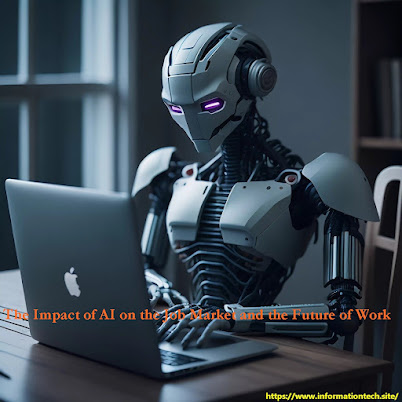The
Impact of AI on the Job Market and the Future of Work
In the era of rapid technological advancements, artificial intelligence (AI) has emerged as a transformative force reshaping various industries. From healthcare to finance, AI's influence is pervasive, and one area where its impact is keenly felt is the job market. As AI continues to evolve, it brings about both opportunities and challenges, ultimately shaping the future of work. In this article, we delve into the profound impact of AI on the job market and explore how it's shaping the landscape of work in the years to come.
- AI's Role in
Job Disruption
The rise of AI has sparked discussions about the displacement of jobs due to automation. Routine and repetitive tasks are increasingly being taken over by AI-powered systems, affecting industries such as manufacturing, customer service, and data entry. While this can lead to concerns about job loss, it's essential to recognize that AI is not merely a job-stealer; it's also a catalyst for job transformation.
- Job
Transformation and Skill Evolution
- Job Transformation and Skill Evolution
As AI takes
over routine tasks, it opens up avenues for job roles that require uniquely
human skills. Creativity, critical thinking, emotional intelligence, and
complex problem-solving are qualities that AI currently lacks, and these skills
are becoming more valuable in the job market. The workforce of the future will
likely see a shift towards roles that involve designing, managing, and
collaborating with AI systems. This transition highlights the importance of
upskilling and reskilling the workforce to align with the demands of an
AI-augmented world.
- Emergence of
New Job Categories
The integration
of AI technology has given birth to entirely new job categories that were
unheard of a decade ago. Data scientists, machine learning engineers, AI
ethicists, and automation specialists are becoming sought-after professionals
across industries. These roles bridge the gap between humans and AI, ensuring
that AI systems are developed, deployed, and managed ethically and effectively.
- AI as a Job
Enabler
Contrary to the
fear of widespread job loss, AI has the potential to create new employment
opportunities. AI technologies often require human oversight, maintenance, and
customization to function optimally. Furthermore, the data-driven insights
provided by AI can empower businesses to make informed decisions, leading to
growth and expansion. As businesses adopt AI solutions, the need for employees
who can interpret and leverage AI-generated insights will grow, leading to the
creation of new roles and responsibilities.
- The Evolution
of Remote Work
AI has also
played a significant role in shaping the future of work by accelerating the
adoption of remote work. AI-powered collaboration tools, virtual assistants,
and communication platforms have made remote work more viable and efficient.
This trend has been further emphasized by the global events of the past few
years, leading to a reimagining of traditional work models.
Conclusion
The impact of
AI on the job market is undeniable, but its influence is not solely negative.
While some jobs may indeed be automated, AI's transformative potential lies in
the opportunities it creates for job transformation, the emergence of new
roles, and the evolution of work models. As AI continues to evolve,
individuals, businesses, and governments must collaborate to navigate the
changing landscape and ensure that the workforce is equipped with the skills
needed to thrive in an AI-augmented world. By embracing AI as a partner rather
than a threat, we can shape a future of work that is dynamic, innovative, and
inclusive.









0 Comments